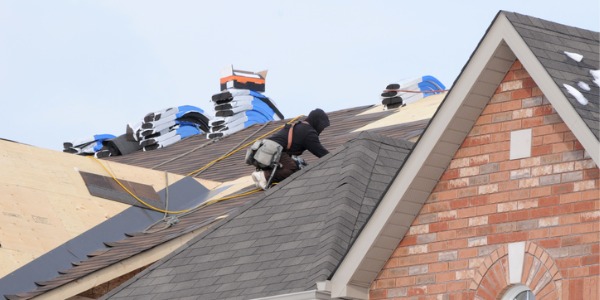What does a Roofer do?

Roofs play an important role in safeguarding structures from weather elements such as rain, snow, and sunlight. Roofers possess the knowledge and skills to select and install appropriate roofing materials, ensuring that roofs are durable, watertight, and properly insulated. Without roofers, buildings would be vulnerable to leaks, structural damage, and compromised energy efficiency.
Duties and Responsibilities
The duties and responsibilities of a roofer can vary depending on the specific project and work environment. However, here are some common tasks and responsibilities associated with the role:
- Installation: Roofers are responsible for installing new roofs on buildings. This involves measuring and cutting roofing materials to fit the roof’s dimensions, laying down underlayment, and attaching roofing materials such as shingles, tiles, or metal panels. They ensure that the materials are properly aligned, secured, and weatherproofed to provide a durable and watertight roof.
- Repair and Maintenance: Roofers are skilled in identifying and repairing various roofing issues. They may inspect roofs for damage, leaks, or deterioration and perform necessary repairs or replacements. This can involve fixing damaged shingles, repairing or replacing flashing, sealing leaks, or patching holes. Roofers also perform routine maintenance tasks such as cleaning gutters, removing debris, and inspecting for signs of wear and tear.
- Safety and Precautions: Roofers must prioritize safety while working at heights. They need to adhere to safety guidelines and use personal protective equipment (PPE) such as harnesses, helmets, and safety glasses. Roofers should be familiar with proper ladder usage and fall protection measures to prevent accidents and injuries on the job.
- Collaboration: Roofers often work as part of a team, collaborating with other construction professionals such as contractors, carpenters, and electricians. They may need to coordinate with team members to ensure proper sequencing of work and to integrate roofing tasks with other construction activities.
- Customer Service: Roofers may interact with customers, addressing their questions, concerns, and providing information about roofing materials, techniques, and maintenance. Good communication and customer service skills are important to ensure customer satisfaction and maintain positive relationships with clients.
Types of Roofers
There are several types of roofers, each specializing in different aspects of roofing installation, repair, and maintenance. Some roofers may have expertise in multiple areas or offer a combination of services. Here are some common types of roofers:
- Shinglers: Shinglers are roofers who specialize in the installation and repair of asphalt or fiberglass shingles. They are skilled in properly aligning and attaching shingles to create a watertight and aesthetically pleasing roof.
- Metal Roofers: Metal roofers specialize in working with metal roofing materials such as steel, aluminum, or copper. They have the expertise to install and repair metal roofs, which often require specific techniques and tools.
- Flat Roofers: Flat roofers specialize in installing and maintaining roofs with little or no slope, commonly found on commercial buildings or some residential structures. They are experienced in working with materials like modified bitumen, built-up roofing (BUR), or single-ply membranes.
- Slate and Tile Roofers: Slate and tile roofers specialize in working with natural or synthetic slate, clay, or concrete tiles. These materials require specific skills in handling, cutting, and securing the tiles to create durable and visually appealing roofs.
- Green Roof Installers: Green roof installers are experts in installing and maintaining roofs that incorporate vegetation or greenery. They have knowledge of specialized roofing systems that support plant growth, provide insulation, and contribute to environmental sustainability.
- Commercial Roofers: Commercial roofers focus on large-scale roofing projects for commercial and industrial buildings. They are familiar with various roofing systems, such as EPDM, TPO, PVC, or metal, and have experience with the specific challenges and requirements of commercial roofing.
- Residential Roofers: Residential roofers specialize in installing and repairing roofs for residential homes. They are knowledgeable about a wide range of roofing materials and are skilled in working on different types of residential roofs.